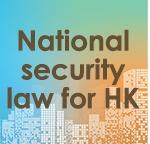The Hong Kong government and a local legal pundit said the United Kingdom’s suspension of its extradition agreement with the special administrative region is a politically driven move that will allow criminals to evade justice.
In a statement issued on Tuesday, a government spokesman said the UK’s unilateral decision that uses the new National Security Law for Hong Kong as an excuse to suspend the agreement “smacks of political manipulation and double standards” because the UK itself has many laws regarding national security.

British Foreign Secretary Dominic Raab said on Monday the UK government will suspend its extradition treaty with Hong Kong “immediately and indefinitely”, and extend an arms embargo to Hong Kong in the wake of the national security legislation.
Expressing a “strong objection”, the Hong Kong government spokesman said the move is gross interference in China’s internal affairs and a grave violation of international law and basic norms governing international relations.
“The decision shines a spotlight on the real possibility that the UK will become a haven for fugitives wanted by Hong Kong who are trying to escape legal responsibility. As such, the UK will need to be answerable to the rule of law and the international community”, the spokesman said.
ALSO READ: China to 'firmly fight back' against UK actions over HK
The decision shines a spotlight on the real possibility that the UK will become a haven for fugitives wanted by Hong Kong who are trying to escape legal responsibility. As such, the UK will need to be answerable to the rule of law and the international community.
HKSAR government spokesman
Hong Kong Executive Councilor and barrister Ronny Tong Ka-wah expressed similar concerns. The suspension of judicial cooperation will only undermine social justice in both places and give perpetrators a chance to escape punishment, he said.
The UK’s decision was nothing more than an excuse to follow the United States’ foreign policy in containing China, he said. The move was neither in line with the rule-of-law spirit that the UK boasts, nor did it show respect for the rule of law on the Chinese mainland and in Hong Kong, he added.
The British move is likely — intentionally or unintentionally — to mislead some people in Hong Kong and the international community, deepening their misunderstanding of the National Security Law, Tong said.
The move may foster the misconception that crimes committed in Hong Kong will inevitably lead to the transfer of suspects to the mainland. Such bias has already been exploited during the “Extradition Bill Incident” last year and causes anxiety and panic among the public of Hong Kong, he said.
READ MORE: China eyes 'resolute response' on possible UK sanctions over HK
Tong also pointed out that the suspension of the extradition pact makes no sense legally because the UK government doesn’t need to fear that the extradition treaty will be abused.
For one thing, in transfer proceedings between two jurisdictions, the decision is always taken by local judges and no one else. It is the British courts, not Hong Kong’s, that provide a guarantee that the extradition arrangement will not be abused, Tong said.
On the other hand, under the standard legal regime around the world, no prisoners held for political crimes or political beliefs can be extradited. Crimes listed in the National Security Law are considered political crimes, and of course, the offenders will not be extradited under the extradition treaty, he added.
READ MORE: The city must understand the ugly truth behind British colonialism
At least two Hong Kong people suspected of breaking the law were stopped by police before heading to the UK in July. In the early hours of July 2, a 24-year-old man was arrested at Hong Kong International Airport. He was wanted on suspicion of stabbing a police officer at a rally the day before.
On Thursday, a 17-year-old girl was found by airport officers before she attempted to leave for the UK. She was arrested on suspicion of assaulting a police officer in Sha Tin in September. The case was brought to court in March. She had been barred from leaving Hong Kong as a condition of her bail.


